Daniel de la Barra
Bio/CV
Available works
Daniel de la Barra
Daniel de la Barra
His work moves between painting, installation and public intervention, his research seeks a horizontal deployment of critical observations based on extensive documentary work. Daniel de la Barra talks about the crisis of the gaze on nature, the representation of the landscape as an extractive process and the points of friction between image, history and modernity.
His multidisciplinary work gives us the opportunity to investigate the colonial conflicts that have relegated nature to a subaltern space of exploitation and domination and to compose an exercise of countervisuality that reflects, from a global perspective, on the representation of the landscape as an extractive and exercise of power. Her work materializes in anti-landscape exercises through socio-environmental violence against neo-extractivism through a political and historical journey, reminiscent of botanical expeditions that reinforce the ways of looking at the natural; as a landscape of conquest.
His multidisciplinary work gives us the opportunity to investigate the colonial conflicts that have relegated nature to a subaltern space of exploitation and domination and to compose an exercise of countervisuality that reflects, from a global perspective, on the representation of the landscape as an extractive and exercise of power. Her work materializes in anti-landscape exercises through socio-environmental violence against neo-extractivism through a political and historical journey, reminiscent of botanical expeditions that reinforce the ways of looking at the natural; as a landscape of conquest.
Bio/CV
Daniel de la Barra
Daniel De La Barra (Lima, Peru, 1992)
De La Barra’s work tells us about the crisis of looking at nature, the representation of the landscape as an extractive process and the points of friction that exist between image, history and modernity. Thus, it allows us to investigate the colonial conflicts that have relegated nature to a subaltern space of exploitation and domination and compose an exercise in counter-visuality that reflects, from a global perspective, on the representation of the landscape as an extractive process and exercise of power. All of this materializes in anti-landscape exercises that explore socio- environmental violence from a political and historical perspective.
De La Barra has exhibited work in 80M2 Livia Benavides Gallery, Lima, Perú (“The Vengeance of the Cacique I: Rapture of Europe”); London (Landscapes Grow under Your Table, Delfina Foundation, 2023; and Frieze London, 2022), Madrid, (La Casa Encendida, Vista a Vuelo de Águila, 2024; Sandretto Foundation, 2024; and Arco Madrid 2024 with 80m2 Livia Benavides Gallery, Barcelona (MINISTERIO at Arts Santa Mònica, 2023; Joan Prats Gallery, Destierro, 2022; This is not a landscape. Episode II, Homesession, 2021; Desired Landscapes, Arts Santa Mónica, 2020; and Subversion: Habitar Ruinas , El Born CCM, 2020); Rome (Royal Academy of Spain 2022); ); 2019); and Madrid (Pateras Carnaval – Wellness Trips, Luminaria 04, 2019).
He has been a resident artist at the Delfina Foundation (London), the Miró Foundation (Palma), the Casa de Velázquez (Madrid), the Royal Academy of Spain in Rome, La Fabrique (French Alliance, Lima), Homesession (Barcelona) and the Piramidón Center d’Art Contemporani (Barcelona), and has received scholarships from the Generalitat de Catalunya (2023), Barcelona Crea (2023) La Escocesa (2019 and 2018) and The Nerdrum School (2018). Likewise, he has been awarded the Barcelona Crea Prize (2023), the Collezione Taurisano Art Nou Prize (2022), the Premi d’Art Jove (2021 and 2019).
De La Barra’s work tells us about the crisis of looking at nature, the representation of the landscape as an extractive process and the points of friction that exist between image, history and modernity. Thus, it allows us to investigate the colonial conflicts that have relegated nature to a subaltern space of exploitation and domination and compose an exercise in counter-visuality that reflects, from a global perspective, on the representation of the landscape as an extractive process and exercise of power. All of this materializes in anti-landscape exercises that explore socio- environmental violence from a political and historical perspective.
De La Barra has exhibited work in 80M2 Livia Benavides Gallery, Lima, Perú (“The Vengeance of the Cacique I: Rapture of Europe”); London (Landscapes Grow under Your Table, Delfina Foundation, 2023; and Frieze London, 2022), Madrid, (La Casa Encendida, Vista a Vuelo de Águila, 2024; Sandretto Foundation, 2024; and Arco Madrid 2024 with 80m2 Livia Benavides Gallery, Barcelona (MINISTERIO at Arts Santa Mònica, 2023; Joan Prats Gallery, Destierro, 2022; This is not a landscape. Episode II, Homesession, 2021; Desired Landscapes, Arts Santa Mónica, 2020; and Subversion: Habitar Ruinas , El Born CCM, 2020); Rome (Royal Academy of Spain 2022); ); 2019); and Madrid (Pateras Carnaval – Wellness Trips, Luminaria 04, 2019).
He has been a resident artist at the Delfina Foundation (London), the Miró Foundation (Palma), the Casa de Velázquez (Madrid), the Royal Academy of Spain in Rome, La Fabrique (French Alliance, Lima), Homesession (Barcelona) and the Piramidón Center d’Art Contemporani (Barcelona), and has received scholarships from the Generalitat de Catalunya (2023), Barcelona Crea (2023) La Escocesa (2019 and 2018) and The Nerdrum School (2018). Likewise, he has been awarded the Barcelona Crea Prize (2023), the Collezione Taurisano Art Nou Prize (2022), the Premi d’Art Jove (2021 and 2019).
Available works
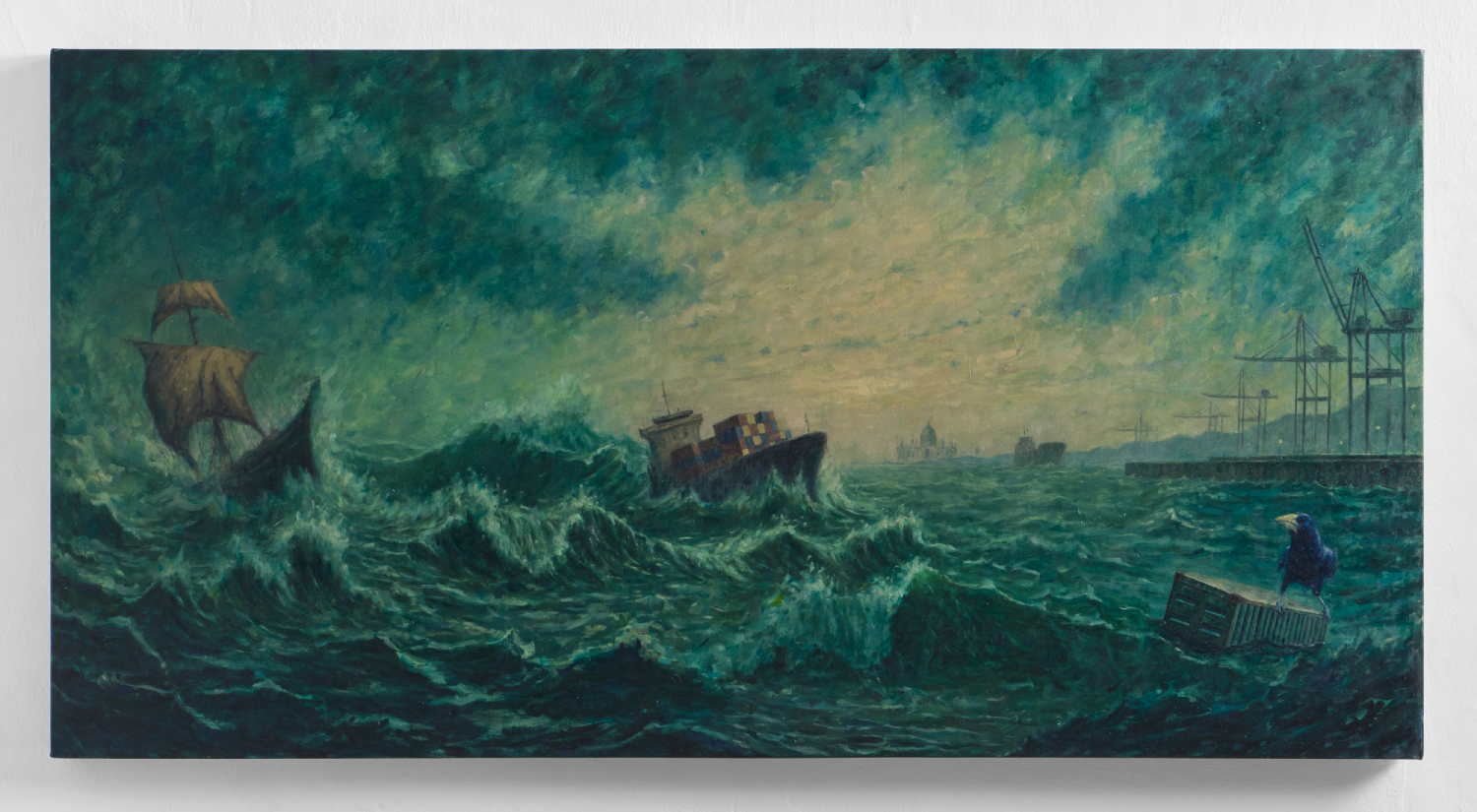
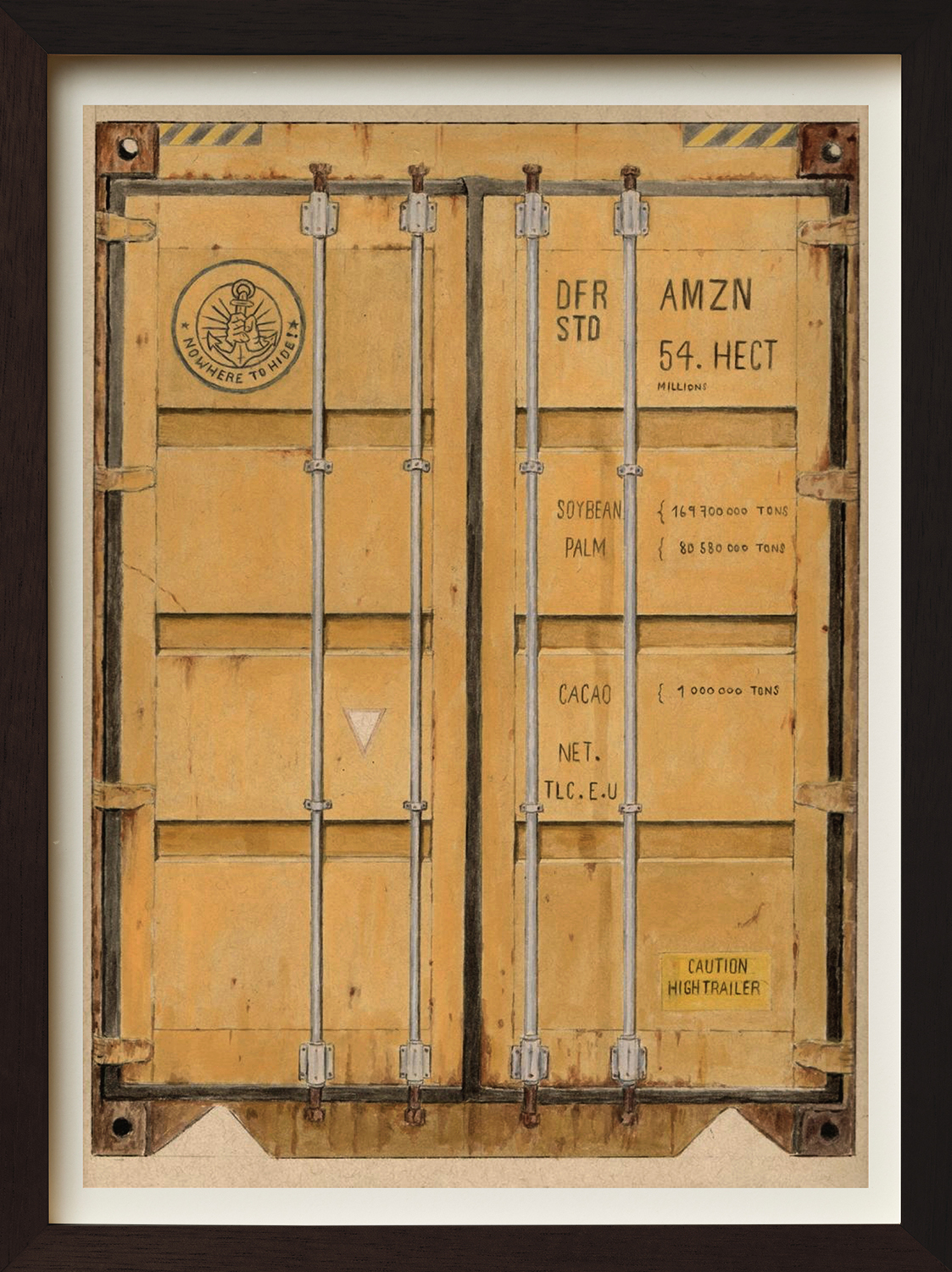
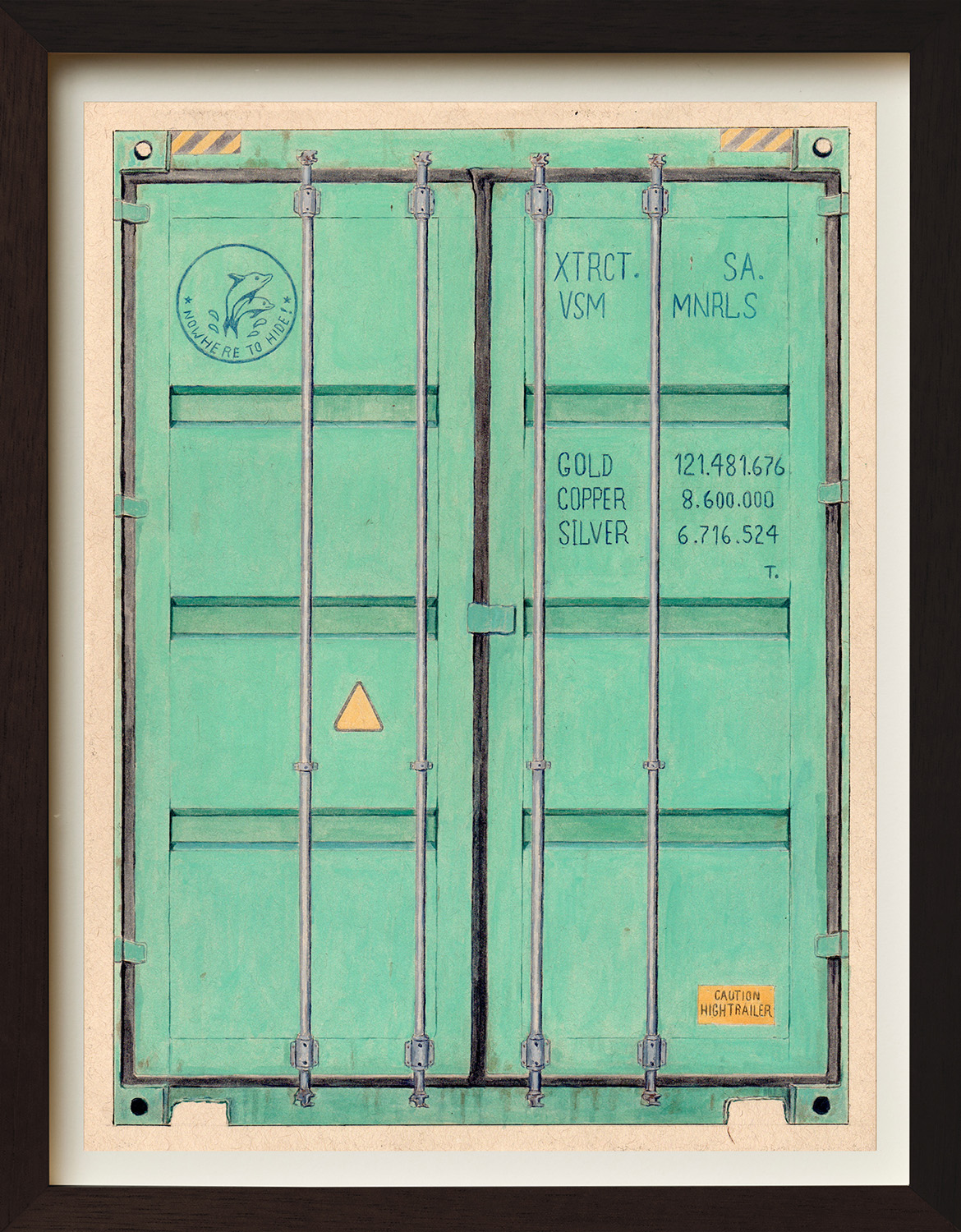
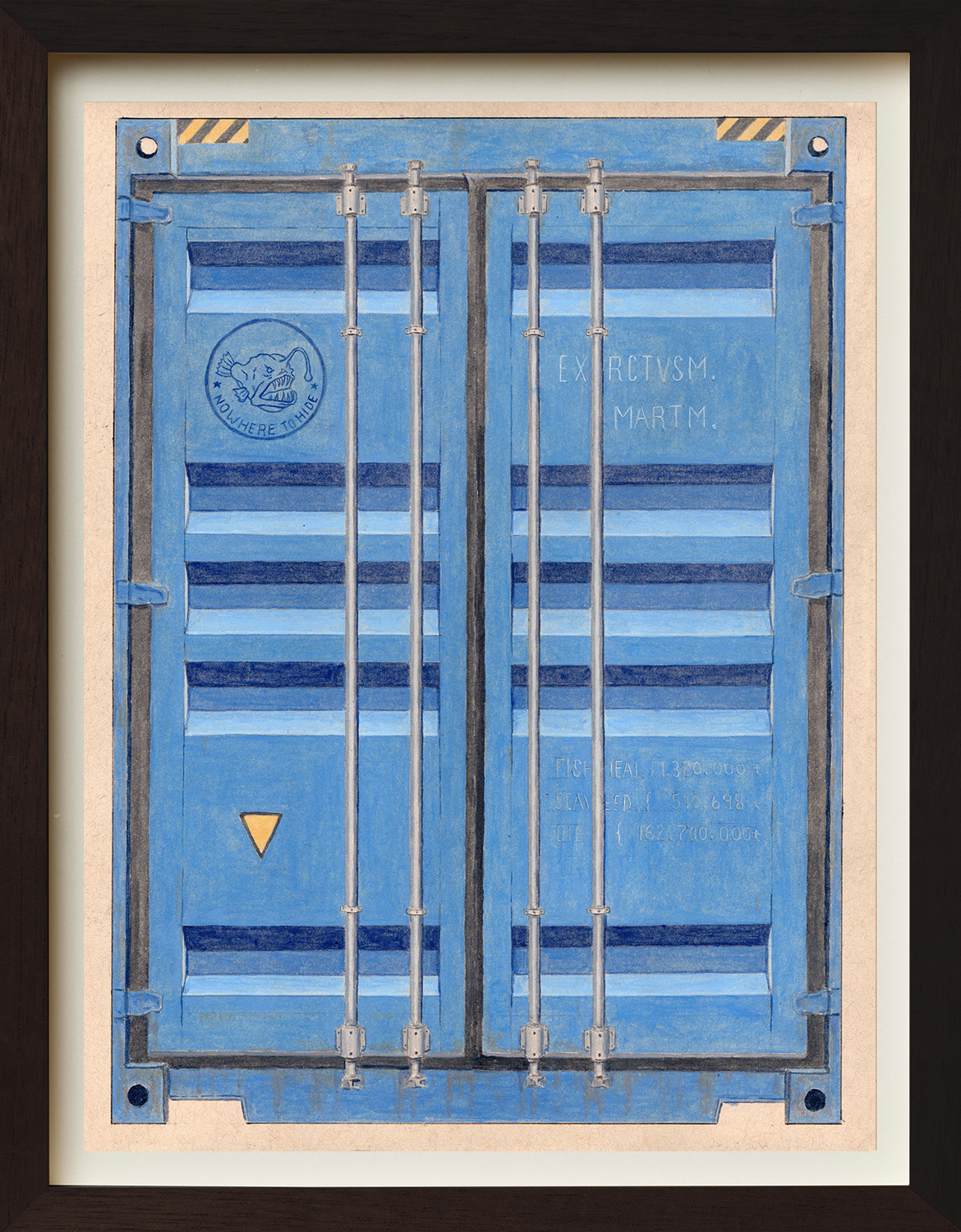
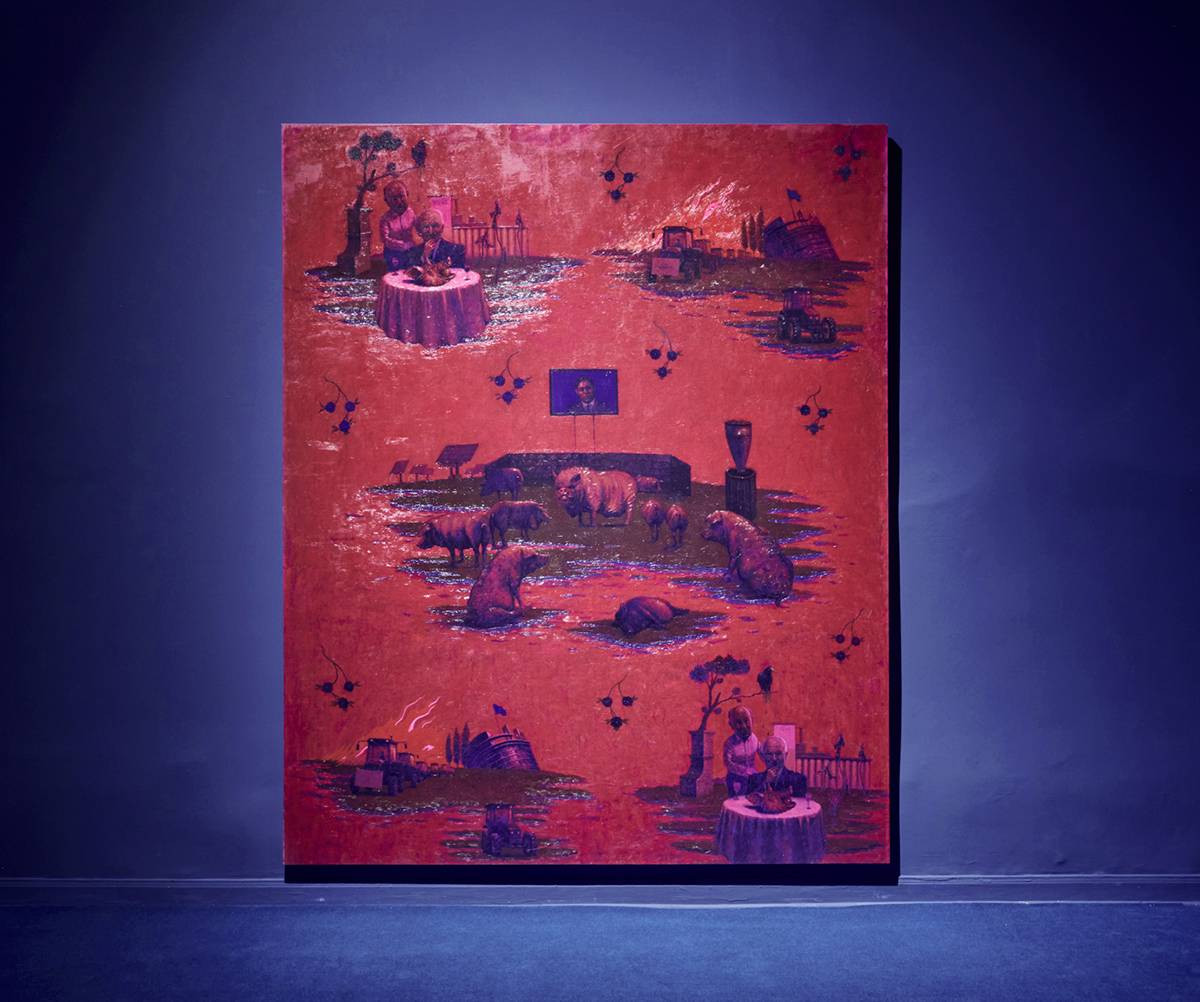
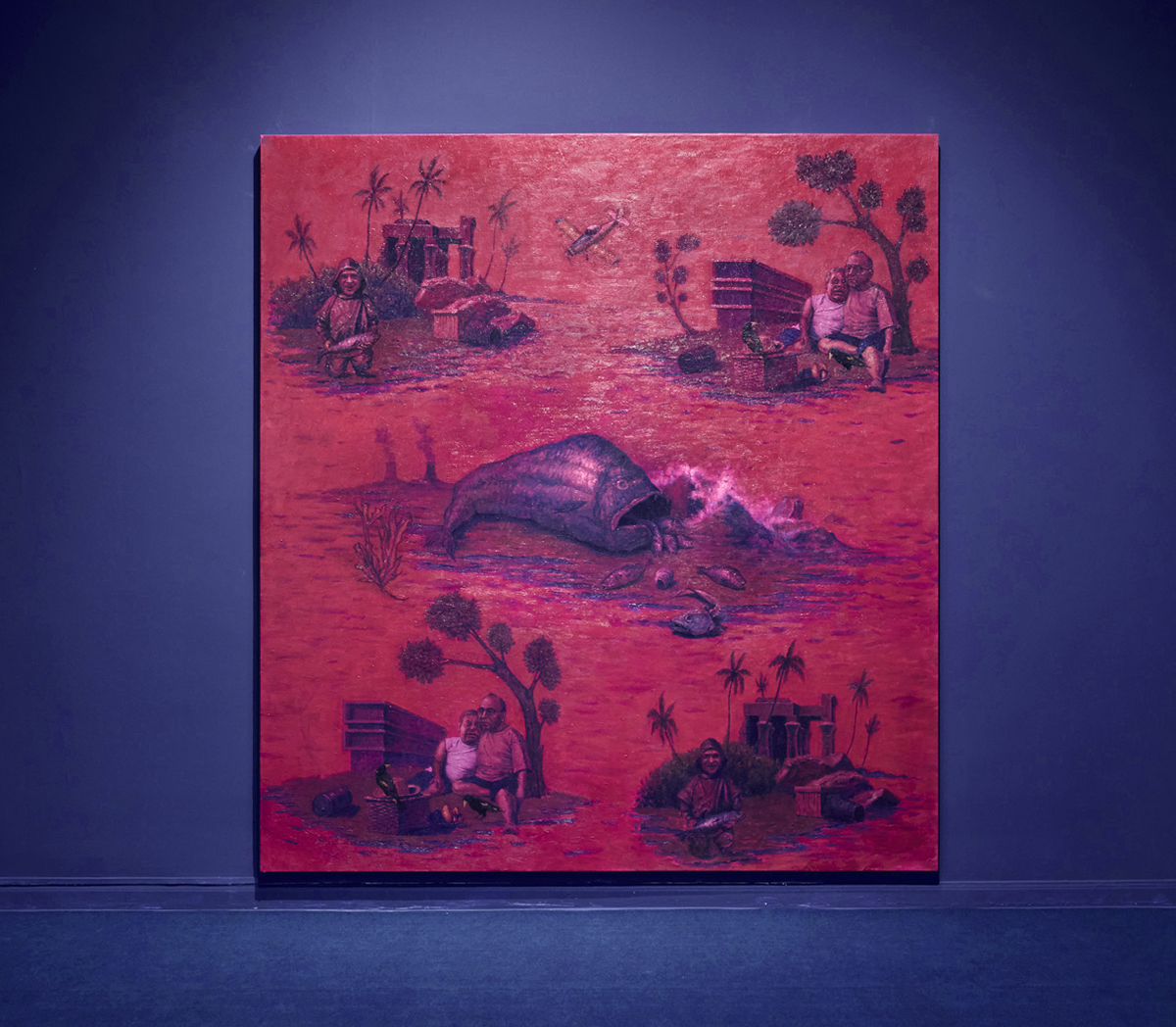
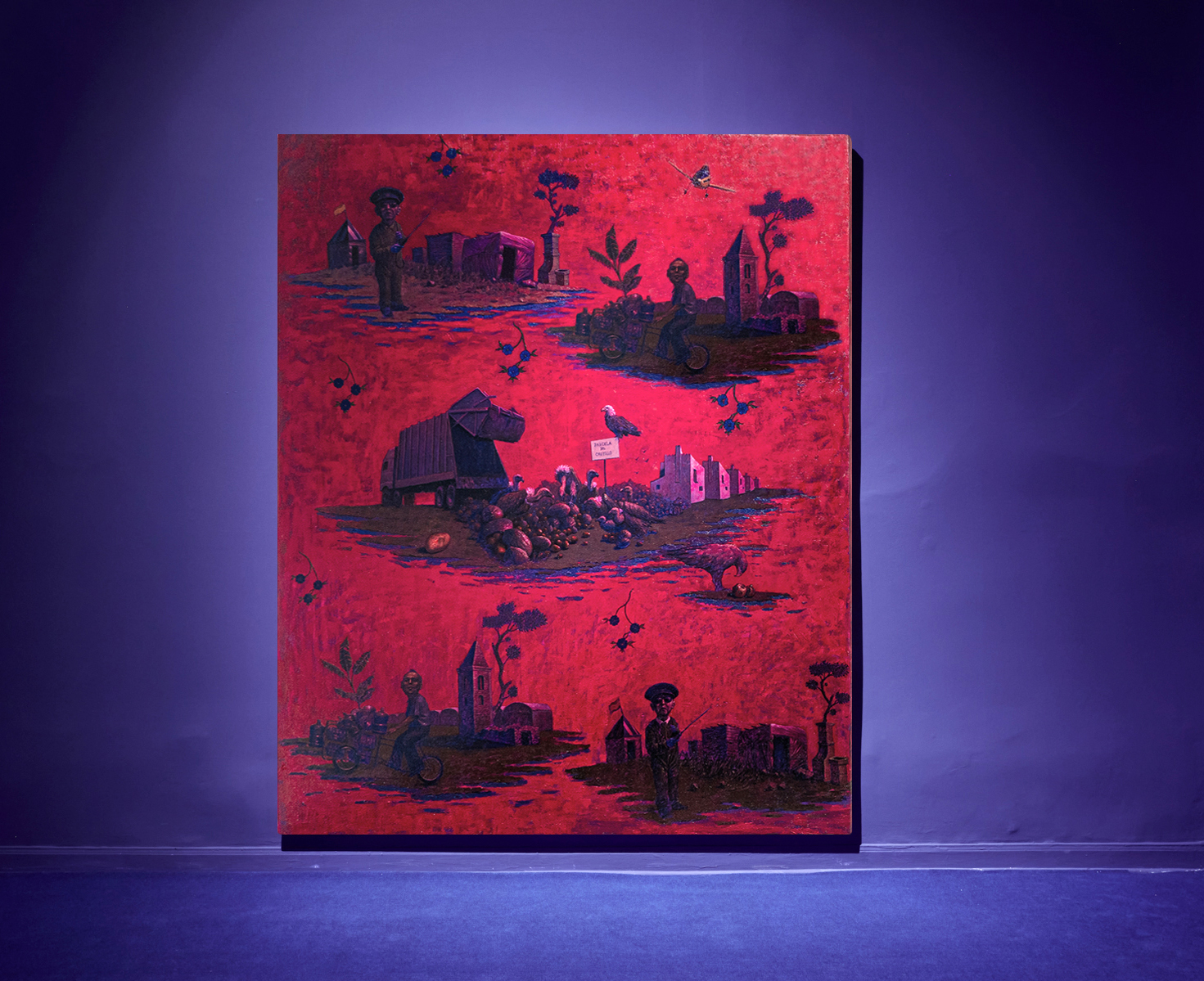

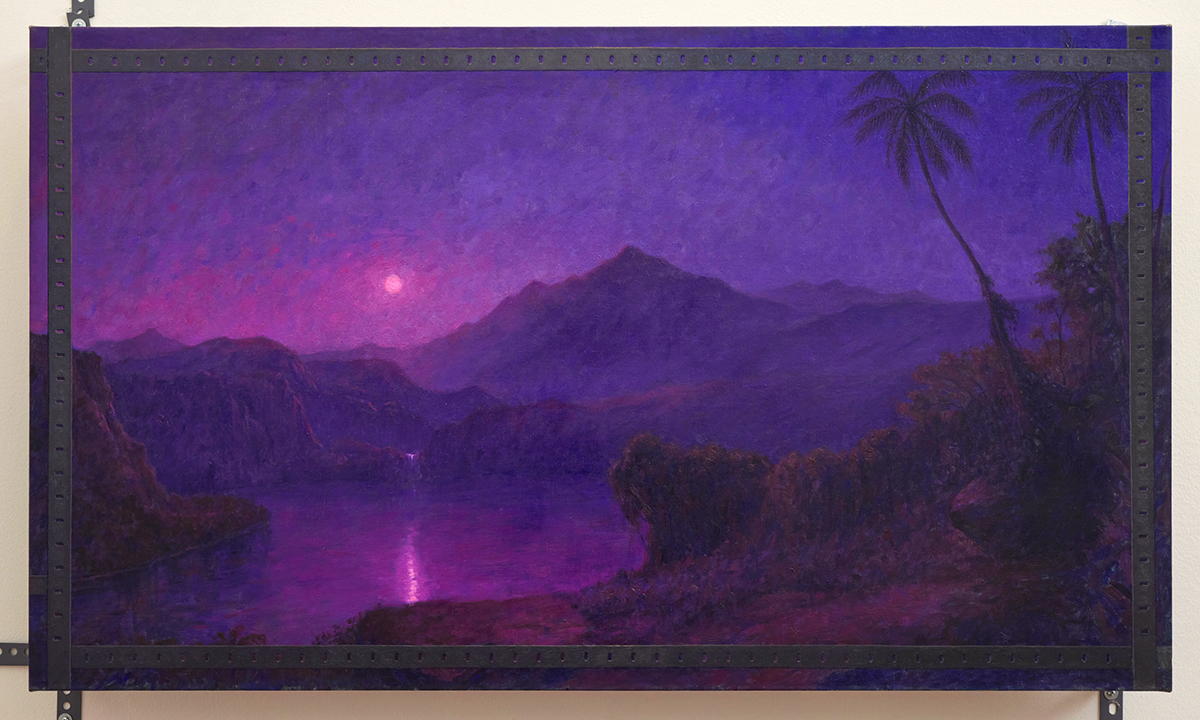
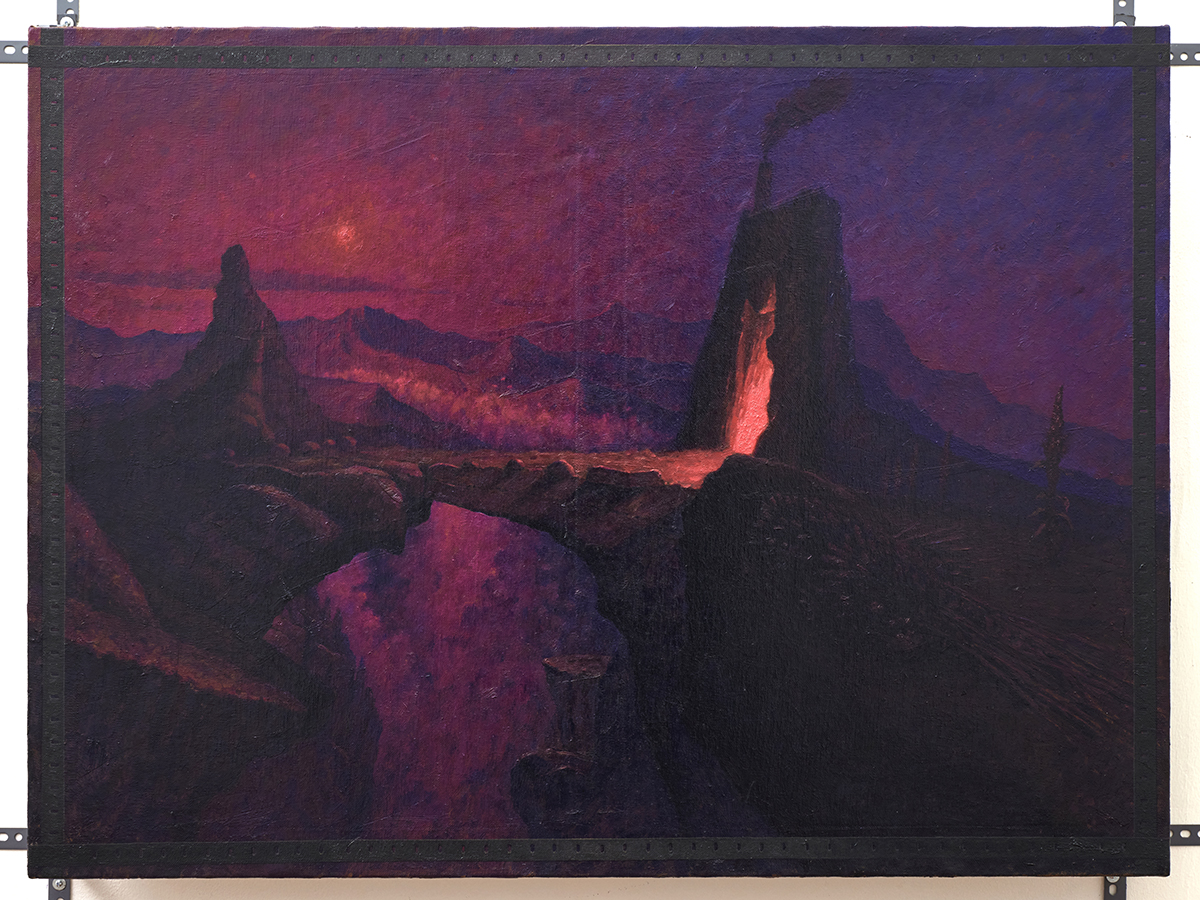
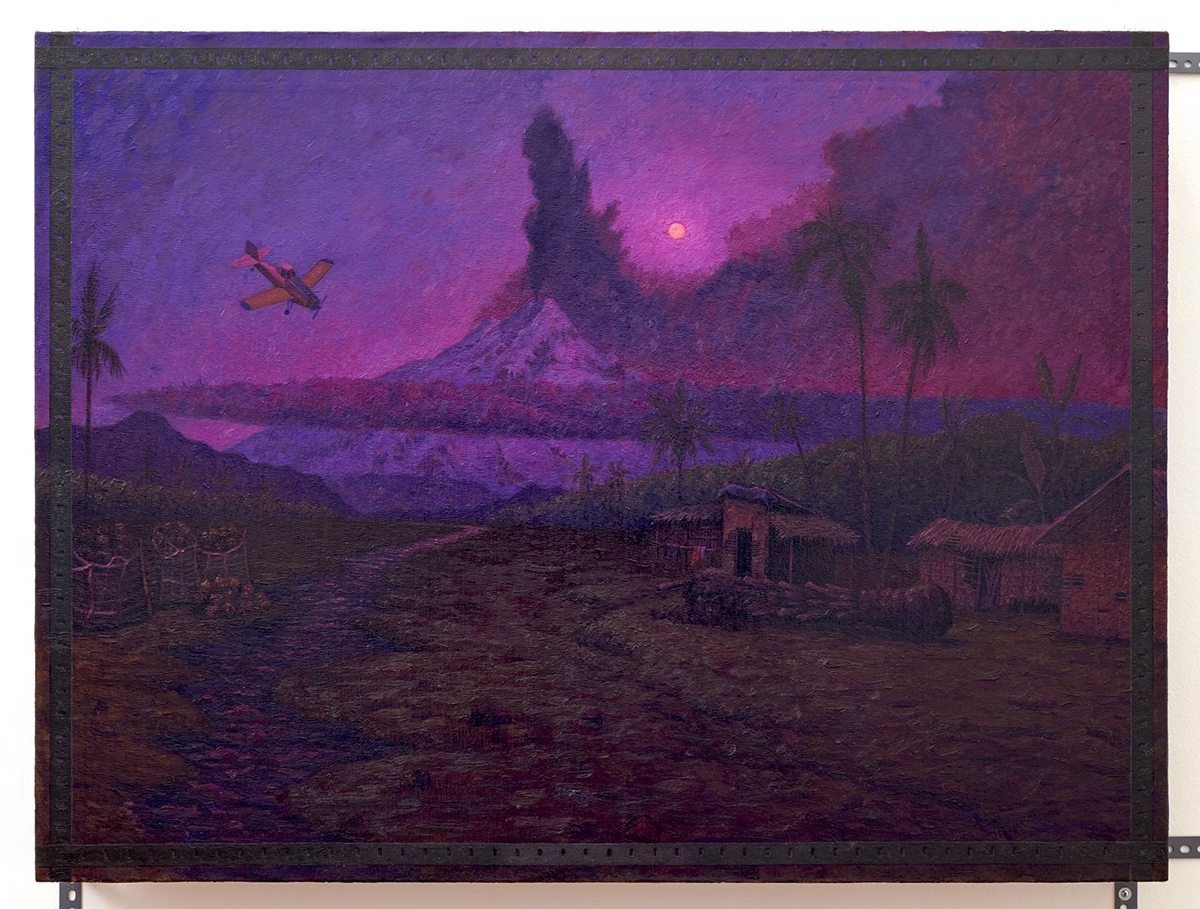
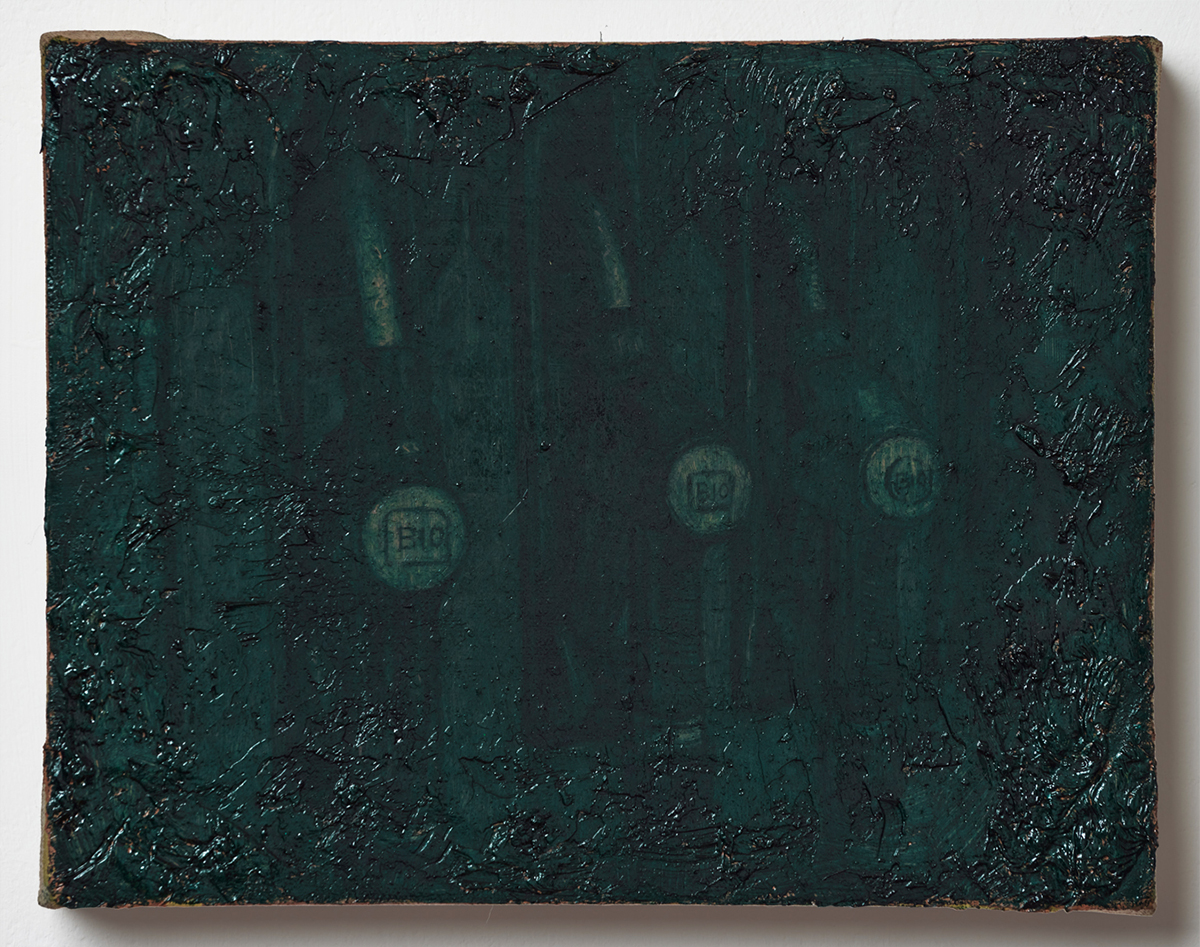
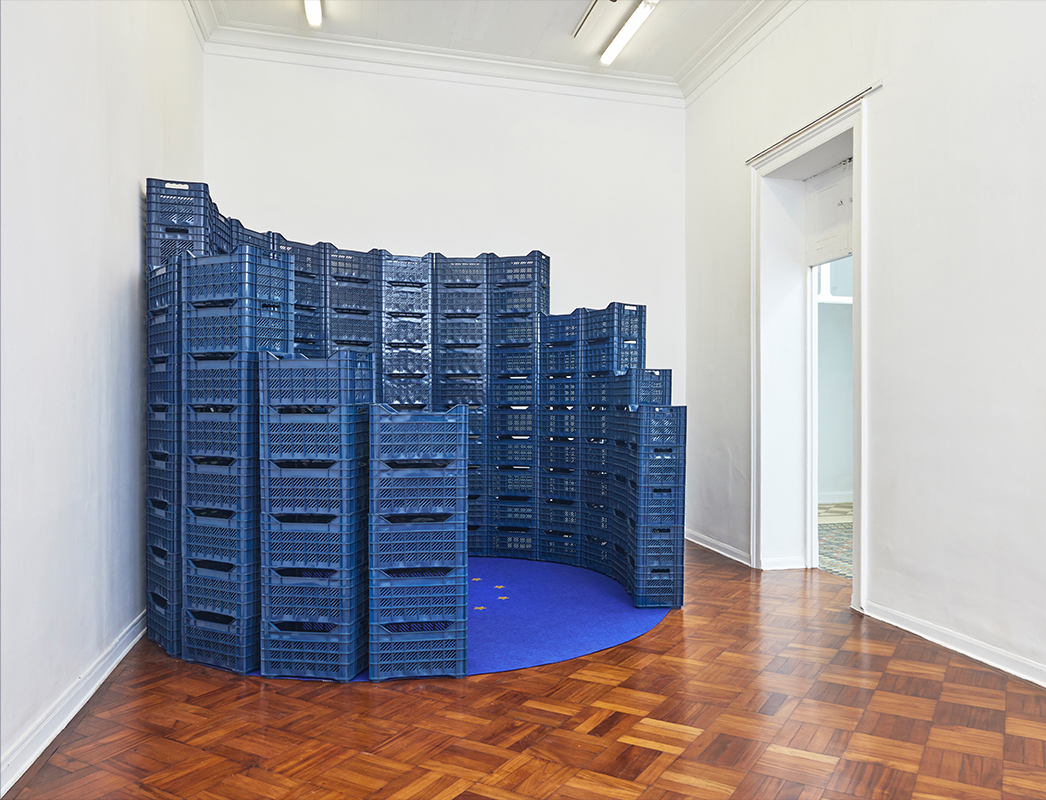
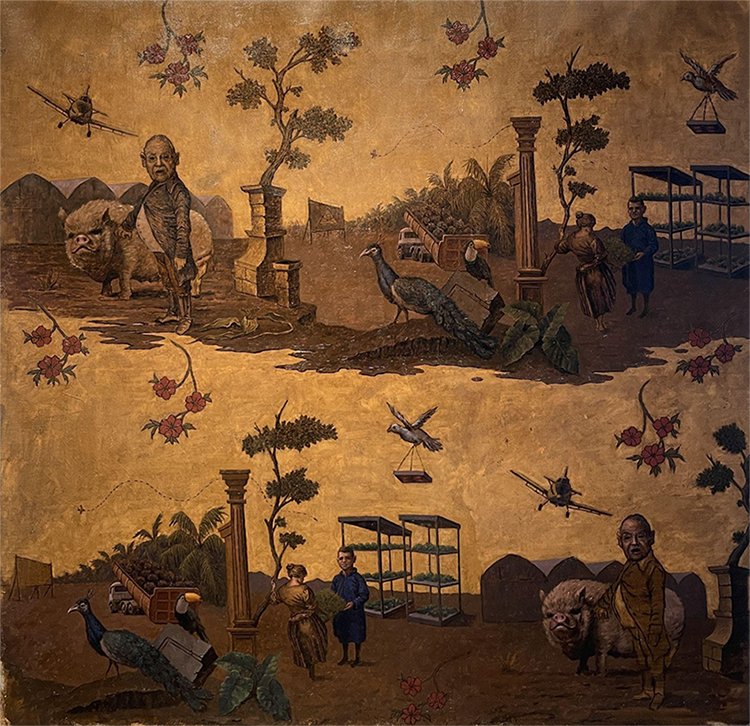
Daniel de la Barra
His work moves between painting, installation and public intervention, his research seeks a horizontal deployment of critical observations based on extensive documentary work. Daniel de la Barra talks about the crisis of the gaze on nature, the representation of the landscape as an extractive process and the points of friction between image, history and modernity.
His multidisciplinary work gives us the opportunity to investigate the colonial conflicts that have relegated nature to a subaltern space of exploitation and domination and to compose an exercise of countervisuality that reflects, from a global perspective, on the representation of the landscape as an extractive and exercise of power. Her work materializes in anti-landscape exercises through socio-environmental violence against neo-extractivism through a political and historical journey, reminiscent of botanical expeditions that reinforce the ways of looking at the natural; as a landscape of conquest.
His multidisciplinary work gives us the opportunity to investigate the colonial conflicts that have relegated nature to a subaltern space of exploitation and domination and to compose an exercise of countervisuality that reflects, from a global perspective, on the representation of the landscape as an extractive and exercise of power. Her work materializes in anti-landscape exercises through socio-environmental violence against neo-extractivism through a political and historical journey, reminiscent of botanical expeditions that reinforce the ways of looking at the natural; as a landscape of conquest.
Daniel de la Barra
Daniel De La Barra (Lima, Peru, 1992)
De La Barra’s work tells us about the crisis of looking at nature, the representation of the landscape as an extractive process and the points of friction that exist between image, history and modernity. Thus, it allows us to investigate the colonial conflicts that have relegated nature to a subaltern space of exploitation and domination and compose an exercise in counter-visuality that reflects, from a global perspective, on the representation of the landscape as an extractive process and exercise of power. All of this materializes in anti-landscape exercises that explore socio- environmental violence from a political and historical perspective.
De La Barra has exhibited work in 80M2 Livia Benavides Gallery, Lima, Perú (“The Vengeance of the Cacique I: Rapture of Europe”); London (Landscapes Grow under Your Table, Delfina Foundation, 2023; and Frieze London, 2022), Madrid, (La Casa Encendida, Vista a Vuelo de Águila, 2024; Sandretto Foundation, 2024; and Arco Madrid 2024 with 80m2 Livia Benavides Gallery, Barcelona (MINISTERIO at Arts Santa Mònica, 2023; Joan Prats Gallery, Destierro, 2022; This is not a landscape. Episode II, Homesession, 2021; Desired Landscapes, Arts Santa Mónica, 2020; and Subversion: Habitar Ruinas , El Born CCM, 2020); Rome (Royal Academy of Spain 2022); ); 2019); and Madrid (Pateras Carnaval – Wellness Trips, Luminaria 04, 2019).
He has been a resident artist at the Delfina Foundation (London), the Miró Foundation (Palma), the Casa de Velázquez (Madrid), the Royal Academy of Spain in Rome, La Fabrique (French Alliance, Lima), Homesession (Barcelona) and the Piramidón Center d’Art Contemporani (Barcelona), and has received scholarships from the Generalitat de Catalunya (2023), Barcelona Crea (2023) La Escocesa (2019 and 2018) and The Nerdrum School (2018). Likewise, he has been awarded the Barcelona Crea Prize (2023), the Collezione Taurisano Art Nou Prize (2022), the Premi d’Art Jove (2021 and 2019).
De La Barra’s work tells us about the crisis of looking at nature, the representation of the landscape as an extractive process and the points of friction that exist between image, history and modernity. Thus, it allows us to investigate the colonial conflicts that have relegated nature to a subaltern space of exploitation and domination and compose an exercise in counter-visuality that reflects, from a global perspective, on the representation of the landscape as an extractive process and exercise of power. All of this materializes in anti-landscape exercises that explore socio- environmental violence from a political and historical perspective.
De La Barra has exhibited work in 80M2 Livia Benavides Gallery, Lima, Perú (“The Vengeance of the Cacique I: Rapture of Europe”); London (Landscapes Grow under Your Table, Delfina Foundation, 2023; and Frieze London, 2022), Madrid, (La Casa Encendida, Vista a Vuelo de Águila, 2024; Sandretto Foundation, 2024; and Arco Madrid 2024 with 80m2 Livia Benavides Gallery, Barcelona (MINISTERIO at Arts Santa Mònica, 2023; Joan Prats Gallery, Destierro, 2022; This is not a landscape. Episode II, Homesession, 2021; Desired Landscapes, Arts Santa Mónica, 2020; and Subversion: Habitar Ruinas , El Born CCM, 2020); Rome (Royal Academy of Spain 2022); ); 2019); and Madrid (Pateras Carnaval – Wellness Trips, Luminaria 04, 2019).
He has been a resident artist at the Delfina Foundation (London), the Miró Foundation (Palma), the Casa de Velázquez (Madrid), the Royal Academy of Spain in Rome, La Fabrique (French Alliance, Lima), Homesession (Barcelona) and the Piramidón Center d’Art Contemporani (Barcelona), and has received scholarships from the Generalitat de Catalunya (2023), Barcelona Crea (2023) La Escocesa (2019 and 2018) and The Nerdrum School (2018). Likewise, he has been awarded the Barcelona Crea Prize (2023), the Collezione Taurisano Art Nou Prize (2022), the Premi d’Art Jove (2021 and 2019).













